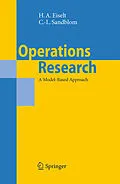The book covers the standard models and techniques used in decision making in organizations. The main emphasis of the book is on modeling business-related scenarios and the generation of decision alternatives. Fully solved examples from many areas are used to illustrate the main concepts without getting bogged down in technical details. The book presents an approach to operations research that is heavily based on modeling and makes extensive use of sensitivity analyses. It is a result of many years of combined teaching experience of the authors.
Klappentext
Since the 1960s, operations research (or, alternatively, management science) has become an indispensable tool in scientific management. In simple words, its goal on the strategic and tactical levels is to aid in decision making and, on the operational level, automate decision making. Its tools are algorithms, procedures that create and improve solutions to a point at which optimal or, at least, satisfactory solutions have been found. While many texts on the subject emphasize methods, the special focus of this book is on the applications of operations research in practice. Typically, a topic is introduced by means of a description of its applications, a model is formulated and its solution is presented. Then the solution is discussed and its implications for decision making are outlined. We have attempted to maximize the understanding of the topics by using intuitive reasoning while keeping mathematical notation and the description of techniques to a minimum. The exercises are designed to fully explore the material covered in the chapters, without resorting to mind-numbing repetitions and trivialization.
Inhalt
to Operations Research.- Linear Programming.- Multiobjective Programming.- Integer Programming.- Network Models.- Location Models.- Project Networks.- Machine Scheduling.- Decision Analysis.- Inventory Models.- Stochastic Processes and Markov Chains.- Waiting Line Models.- Simulation.
